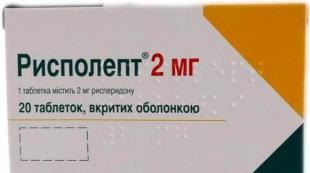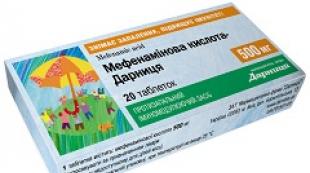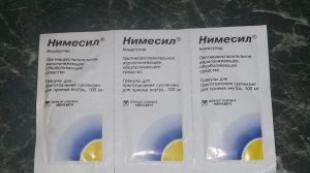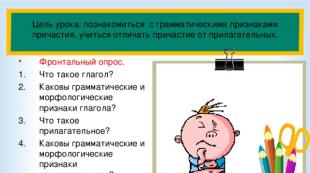Sore throat - treatment. Use for fever and colds. Contraindications and side effects
To the question: What antibiotics are prescribed for a sore throat? given by the author Eurovision the best answer is I took Amoxicillin (or amoxicycline, I don’t remember exactly), it helped me very quickly (within 3 days maximum)
Answer from 22 answers[guru]
Hello! Here is a selection of topics with answers to your question: What antibiotics are prescribed for sore throat?
Answer from Aizhana Dyusupova[guru]
penicillins, if you are allergic to them, then macrolides
Answer from philosopher[guru]
Are we self-medicating?
Answer from Rustic[guru]
Sore throat - very serious illness, was ill herself, and suffered greatly from it in adolescence! After removal of tonsils, I got inflammation meninges(complication after surgery - the doctor performed the operation at a temperature of 38), was treated for a long time. Until now (25 years have passed), in the absence of tonsils, it is very rare, but I get a purulent sore throat, thank God, I haven’t been sick for a long time! Therefore, I advise only the help of a doctor! And rinsing with sea salt (or plain salt) helps a lot!
Health to you!
Sore throat (sore throat)
Sore throat is a type of acute inflammation of the tonsils (the same ones that are colloquially called “tonsils”). They are located on the sides of the entrance to the pharynx and are clearly visible if you look into the open mouth. Scientifically, inflammation of these tonsils is called tonsillitis, and tonsillitis is only its variety, which is acute inflammation, caused by one single microbe (beta-hemolytic streptococcus group A - its full name) . This increased attention to one single form of tonsillitis is due to the fact that sore throat is often very severe and gives dangerous complications(including fatal ones!).
Symptoms of sore throat - sore throat, especially when swallowing, elevated temperature (39-40 degrees, can reach 41 degrees), severe weakness, headache, enlarged lymph nodes that can be felt under lower jaw closer to the neck (palpating them is painful). Children (especially small ones) also have the following symptoms: refusal to eat, drooling (this is due to the fact that it hurts to swallow), children cannot unclench their teeth (this is called trismus masticatory muscles) . If you can see the tonsils, they look like this: red, covered with purulent plaque ( white-yellow color) - the so-called lacunar tonsillitis, - or, as it were, stuffed with light yellow bubbles, similar to grains of rice - follicular tonsillitis.
The most dangerous complications of angina:
V early dates- pharyngeal abscesses (formation of large cavities filled with pus), spread of infection into the chest, into the cranial cavity with the development of inflammation of the meninges (meningitis), infectious-toxic shock (poisoning of the body with waste products of microbes and decay of body tissues), sepsis ("infection blood", i.e. the penetration of infection into the blood and its spread throughout the body);
in the later stages (after 2-4 weeks) - rheumatism (disease connective tissue with damage to the joints, heart, brain), glomerulonephritis (inflammation of the kidneys of non-infectious origin, leading to severe health disorders, up to renal failure) .
From this short list of complications it follows that sore throat must be treated not just necessarily, but strictly necessary! Sore throat is treated with antibiotics, which should be prescribed by a doctor.
Another one important feature- sore throat is contagious, so the patient must be isolated, children and the elderly should not be allowed near him, he must have his own utensils, which no one should use during the period of illness.
WHAT TO TREAT
Drugs used in treatment (only as prescribed by a doctor and under his supervision!)
1. Disinfectants: (only in addition to the main treatment with antibiotics!!)
Hexasprey
Faringosept
Sodium tetraborate (Borax) solution in glycerin 20%
Hexoral
2. Antibiotics:
Cephalexin
Ampicillin
Rocephin
Sumamed
Extensillin
Rulid
Klacid
Cefamezine
Syphlox
Lendatsin
3. Local painkillers:
4. Painkillers and anti-inflammatory:
Acetylsalicylic acid
Efferalgan
Aspirin York
Ketonal
Paracetamol tablets 0.5 g
Ibuprofen film-coated tablets 0.2 g
Paracetamol tablets 0.2 g
Acetylsalicylic acid tablets
Panadol
Dolgit cream
The aspirin mixture is made like this: take two tablets and dissolve in a glass (250 ml) of warm water by stirring lightly with a spoon. Gargle with aspirin and water. Usually, after one such rinse, the pain subsides, and this procedure lasts for 6 hours.
According to the Common Cold Centre, who conducted experiments with aspirin at Cardiff University, inhaling menthol-based vapors is beneficial for the throat. Both procedures with aspirin and inhalation of menthol facilitate nasal breathing. This happens because the mucous membranes of the nasopharynx are moistened and the mucus is thinned. At the same time, you can also observe the effect local anesthesia which is caused by a feeling of cold.
And in New Zealand they studied a similar effect on the throat of certain types of honey. It turned out that in the studied varieties of this natural medicine There is hydrogen peroxide, which quickly “removes” a sore throat. It is important to know that it is best to use all these remedies before going to bed, then the effect will be greater.
This resource may contain materials 18+
Why take Aspirin for a sore throat?
Sore throat is recognized as one of the most common infectious diseases of the throat and upper respiratory tract. Treatment of the disease is primarily aimed at combating infection and high fever. Aspirin for sore throat as an antipyretic can be quite effective if used correctly.
It must be remembered that therapy must be comprehensive. Aspirin in the treatment of sore throat can only act as additional remedy. Antipyretic drugs alone will not work. Moreover, if you take the drug Aspirin for a sore throat without antimicrobial drugs, you can “lubricate” the symptoms of the disease, which quite often leads to various complications.
The consequences of incorrect treatment with Aspirin are especially dangerous for children, since this disease mainly affects young patients of preschool and junior age. school age. An adult is less susceptible to sore throat than a child, but also among older people this pathology It’s not that uncommon and should be treated under the supervision of a doctor.
Symptoms of the disease and its treatment
By frequency of occurrence purulent sore throat is in second place, after the flu. It can be caused by bacteria (the most common cause), viruses or fungi (rarely). Bacterial (purulent) sore throat is the most severe. In this case, there are symptoms such as:
- heat(in addition to Aspirin, ibuprofen or paracetamol will help);
- severe inflammation of the throat mucosa;
- severe pain when swallowing;
- loss of voice;
- headache (you can take analgin).
Most often, with a sore throat, a staphylococcal or streptococcal infection is detected in a throat smear, for which Aspirin has practically no effect. In this case, the doctor will definitely prescribe the appropriate antibacterial therapy, and treatment of sore throat with Aspirin and analgesics will act as additional measure for improvement general condition sick.
At viral nature Antibiotics, as a rule, are not prescribed for diseases, since they do not have any effect on viruses. In this case, treatment for sore throat is exclusively symptomatic, when, along with Aspirin, the doctor prescribes paracetamol or another analgesic to the patient.
IN exceptional cases, If viral sore throat occurs acutely with the addition of a secondary bacterial infection, the patient is prescribed specific antiviral and antimicrobial treatment with the additional use of Aspirin as an analgesic.
For candidiasis of the throat, they are prescribed antifungal drugs. Acetylsalicylic acid, however, is usually not prescribed. Drinking the drug for a sore throat that is not accompanied by pain and high fever is pointless, since its main effect is precisely aimed at eliminating such unpleasant symptoms.
For minor inflammation of the throat, you can limit yourself to gargling it with an Aspirin solution. To prepare the product, two or three tablets of the drug are dissolved in a glass of water. If you have a sore throat (if the course of the disease is not acute), you can gargle with this remedy with Aspirin three to four times a day.
Found a mistake? Select it and press Ctrl + Enter
IMPORTANT. The information on the site is provided for informational purposes only. Do not self-medicate. At the first sign of disease, consult a doctor.
Aspirin helps with sore throat
Review: Acetylsalicylic acid tablets - Treating sore throat with aspirin for children and adults - a proven and effective method
Comments to the review (20)
And Aspirin is the gold standard for treating colds and even flu. It not only reduces pain and inflammation, but also protects immune cells.
Children under 12 years old should not take it, because it is extremely in rare cases, but Reye's syndrome may occur. Although it is diagnosed by the method of exclusion after refuting a dozen other diseases. But for ethical reasons, the company that first synthesized aspirin banned giving it to children.
As for cheap aspirin, I don’t recommend buying it - some types don’t even dissolve in water. They lie in the stomach and eat it away. I recommend the effervescent form. It is the best-selling cold remedy in Europe and America due to its effectiveness and safety. Be healthy!
Aspirin helps with sore throat
Aspirin is one of the most effective means for sore throat. If you dissolve a couple of tablets in a glass warm water, and then gargle, then after two hours the pain will noticeably subside.
This effect lasts for more than six hours: this information was provided by researchers from Cardiff University.
Scientists say that inhaling menthol vapors is no less beneficial for the throat. This will greatly facilitate nasal breathing by moisturizing the mucous membrane and thinning the mucus, and helps with sore throat due to the effect of local anesthesia caused by the feeling of cold. But workers from the University of Waikato in New Zealand found that certain types of honey can also fight sore throats. This is due to the fact that it contains hydrogen peroxide. More precisely, it contains a certain enzyme (glucose oxidase), which promotes the production of peroxide, which has antibacterial properties. The best way to prevent nighttime coughing attacks is to consume honey before bed. It turns out that it is even inferior to the popular antitussive drug, dextromethorphan.
IN Lately Experts are actively researching the properties of aspirin, and very interesting nuances have already been discovered.
Partial or complete reprinting is permitted only with the hyperlink http://mednovelty.ru (on the Internet) or a text link (in print).
Category announcements
It so happens that in the fall people become vulnerable to infections that cause colds and flu. It's not that cold outside yet - but winter is approaching, and we must be more attentive to our health and well-being.
A team of researchers led by Dr. Iain Whitaker from Morriston Hospital was able to use 3D printing to create cartilage tissue that is suitable for transplantation.
Sleep apnea may increase the risk of developing gout, a new study finds. Among 9,865 patients with newly diagnosed sleep apnea and weight-matched controls, the researchers identified 270 new cases of gout over the course of a year.
Lizards and owls are among the living species that can help us better understand human deafness. This conclusion was reached by researchers from the University of York.
People who use cochlear implants due to profound hearing loss respond to certain aspects of music, contrary to popular belief and limited scientific research.
Rhythmic head bobbing, foot stomping, or palm clapping is a natural response for many people to music. But what about those who do not perceive percussive sounds?
In the United States, about 34% of the country's adult population is obese. Excess weight is considered a major risk factor for the development of obstructive sleep apnea.
A small fish that lives in fresh water, can help in the treatment of respiratory diseases in humans, experts from the Institute of Molecular and cell biology. They discovered hundreds of new genes in zebrafish.
For gene therapy specialists used a cochlear implant. It allows you to grow auditory nerves, as a result of which significant improvement in hearing can be achieved.
Hearing loss in older people leaves a deep imprint on their consciousness. In the new study, experts observed 400 people in the same age group over a six-year period.
It is known that Botox is currently used in cosmetology to relieve migraine attacks. Now doctors intend to use it to cure asthma.
Sleep disorders are a very common problem: about 15 percent of the population suffers from insomnia, about 30 percent of adults snore, and 4-7 percent of the population has a syndrome called obstructive apnea (sleep apnea).
March 14 is World Sleep Day. Philips announces the launch of a global program called Sleep Powers 2014 to raise awareness of the importance of healthy sleep for a fulfilling life.
Experts conducted an unusual study, the main task of which was to find new ways to combat snoring and apnea, which negatively affect the human body.
A new wirelessly rechargeable cochlear implant can use the natural microphone in the middle ear instead of an external sensor.
Feelings of some kind of pain, during the experience of which a certain smell was felt, force the olfactory neurons to subsequently perceive this smell several times more acutely.
A new smartphone-based otoscope provides clear, shareable images of the eardrum so patients can be diagnosed without visiting a doctor's office.
A new study provides compelling evidence that horn players are at risk of hearing loss as a result of exposure to potentially harmful sound levels associated with occupational activities.
Wine that is infected with cork disease has a musty and unpleasant taste due to the fact that its main component, trichloroanisole, blocks the human olfactory receptors.
It has been established that the intense rhythm of megacities has a very negative effect on the condition of the human hearing system. Its components simply cannot withstand such a heavy load.
Popular medical news
Ultrasound technology in last years has progressed significantly. A group of obstetricians and gynecologists says ultrasound is more cost-effective and safer than other imaging tests. female pelvis and should be the first choice used in patients with pelvic symptoms.
Recently, city clinics have recorded an increase in the number of visits to otolaryngologists with complaints of hearing loss and ear pain. Oddly enough, it is mainly young people, aged 16 and over, who turn to ENT doctors for medical help. As it turned out, people of this type have a hearing problem. age category occurs mainly among students, day and evening students.
In 2007, The Lancet published an article describing a unique treatment for hyperhidrosis using Botox. degree of hyperhidrosis or increased sweating The woman's was so large that sometimes sweat could literally drip from her palms.
Not every aspirin will relieve a sore throat.
Aspirin is the most the best remedy to get rid of sore throat, as scientists have found. True, you need to buy a soluble form of the medicine.
Scientists from Cardiff University in the UK found that two tablets of soluble aspirin are enough to get rid of a sore throat in just two hours. But the medicine should not be drunk - they just need to gargle thoroughly. Wherein positive effect after applying the solution, it remains for 6 hours. Also effective method Inhalation of drugs containing menthol turned out to combat colds.
So it is useful to treat children suffering from colds with honey before bedtime - this product suppresses cough symptoms and allows the child to get a good night's sleep. Moreover, honey does this better than dextromethorphan, which is found in the most popular cough syrups. Ear acupuncture is another unusual remedy that has proven to be very effective in this matter. True, scientists cannot yet understand why.
General practitioner's blog
All about diseases and their treatment. If you have questions regarding medicine, write. I will be happy to help you!
Monday, October 15, 2012
13 Sore Throat Remedies You Can Use at Home
The mechanism of sore throat is quite simple. This is an inflammation of the pharynx. Main causes of discomfort:
A sore throat from a viral source usually goes away on its own within a few days.
19 comments:
Interesting article. Very often, doctors advise drinking alcohol for prevention." cat claw", what can you say about its benefits? For example, an article with its properties - Using a cat's claw (Una De Gato)
The tips are really interesting, although I’m already used to treating a sore throat with a spray, I use an anti-angin spray, it soothes well sore throat. And if I’m going to go somewhere, I take lozenges with me; in terms of effectiveness, they are in no way inferior to a spray.
A very informative article, but I, too, have long ago chosen an effective way to treat my throat. These are rinses with soda and pharyngosept. I’ve been curing my throat when I have a cold for about seven years in exactly this way. I really like this medicine because it does not contain antibiotics.
Thank you for the article, I highlighted a lot of interesting and useful things for myself. I’ll keep this in mind for the future) I usually drink a lot of liquids when I have a sore throat, I especially like tea with honey and lemon, and Strepsils Plus spray also helps me a lot. I always keep it in the pharmacy, it has never let me down)
I chose faringosept for treatment, since there is no need to take it after the symptoms disappear, such as decatylene. Faringosept is a safe and effective drug. I believe that it is most suitable for treatment, since it does not cause side effects such as irritation and stomatitis.
Well, I would also recommend the Omron CompAir NE-C28 Nebulizer for this matter. Home page It personally helped me a lot at one time)
Maryana, I really like the anti-angin formula tablets. I've recently weakened my immune system with stress, and now the slightest hypothermia and my throat immediately starts to hurt. It’s these pills that save me – when the pain appears, I immediately begin to dissolve it and by the evening I almost don’t feel it. What is the advantage of such tablets is that they also remove the infection, preventing its spread throughout the body. And vitamin C supports my immunity. I also take vitamins periodically, but they quick effect they don't bring it. So the anti-angina formula is really a salvation for me.
And I also like faringosept better. It not only treats the throat, but is also indicated for stomatitis. It is important for me that after using Faringosept these ulcers in the mouth do not occur, such as after strepsils and others.
I myself recently fell ill just before leaving vacation; swallowing was terribly painful. Only bioparox helped me, it acts locally only on the source of inflammation, and does not irritate the gastrointestinal tract. And it’s very convenient, you don’t have to carry a bunch of pills with you, and sick leave is not an option for me.
It says here that you can drink coffee, lemonade and eat sweets, but on another site you can’t eat either
I agree with Tatyana Pravikova, bioparox helps well. My therapist herself said that this is the most effective remedy. It contains an antibiotic, but it does not pass through the body, because... Its effect is local. There are also 2 nozzles, you can spray it on your nose when you have a runny nose - it helps.
Gargling is definitely good and helps. you just need time for them, which is sorely lacking(
Anna, then listen to the commentator above and buy Bioparox. This is a spray. Although it is an antibiotic, it is natural and acts locally. For people like you who always lack time, this is an ideal option) Very convenient to use (you can carry it with you everywhere - it takes up little space and is included special bag) and is effective. I treat all acute respiratory viral infections and acute respiratory infections with its help, it always helps
And when I feel soreness and pain, I immediately dissolve Tonsilotren. I have already tried its effect on myself for a long time. I like that the tablets quickly dissolve in the mouth and remove unpleasant painful sensations when swallowing. And even a sore throat can be cured effectively.
I agree that the article is interesting and relevant! I’m used to treating my throat with herbal inhalations and spraying Olefar spray. A pharmacist friend recommended it to me. The product contains a lot of herbs, which is very important to me! During the day, I drink a lot of tea with lemon and wrap myself up warm. After a few days, the cold usually goes away.
At the first sign of soreness and dryness in the throat, I dissolve Isla-Mint lozenges. They moisturize the throat and eliminate discomfort. They helped more than once.
So I’m starting to get a tickling sensation, rinsing it doesn’t help(((
Victoria, I can’t gargle at all; my reflex immediately starts to be bad. This is why I prefer to buy Grammidin for throat relief. Their price is quite normal, I'm happy.
Aspirin for sore throat
If your sore throat is caused by a viral infection, antibiotics will not help. But lozenges that contain phenol will help relieve a sore throat. Phenol can kill bacteria found on the surface of the mucous membrane of the throat. And the moderate analgesic effect of phenol helps to numb the sensitive nerve endings, as a result of which the throat begins to hurt less. When purchasing such lollipops at a pharmacy, you must strictly adhere to the instructions for their use.
Lozenges containing zinc may help if a sore throat is associated with a cold. One tablet of zinc gluconate, taken every 2 hours (if it is slowly dissolved in the mouth), helps not only reduce sore throat, but also eliminate other cold symptoms. However, zinc supplements should not be taken for longer than 7 days, as it may compete with other microelements in the human body.
If you experience pain while swallowing, it means that the sore area is located high enough in the throat that gargling can relieve the pain. So gargle frequently with one of the solutions below, but know that if you have wheezing or coughing, gargling will not help.
Stir 1 tsp. table salt in 0.5 liters of warm or room temperature water. Gargle every hour, but do not swallow the liquid.
Soak 1 teaspoon of dried chamomile in 1 cup of hot water and strain. Let cool until warm state and gargle.
Squeeze some lemon juice into a large glass with warm water and gargle.
Sometimes a sore throat when you wake up is caused by sleeping with open mouth. Typically, the air entering the throat and lungs is moistened in the nose. But when breathing through the mouth, this stage is skipped, and the throat becomes dry and irritated. If you have a sore throat or dry throat, add steam inhalation to your bedroom humidifier. Put it in the bathroom sink very hot water to create steam. While the water is running from the tap, lean over the sink, covering your head with a towel to trap the steam, and inhale deeply through your mouth and nose for 5-10 minutes. If necessary, repeat the procedure several times a day.
If nasal congestion is one of the reasons you're mouth breathing, use a nasal spray that contains a decongestant to clear it. But limit its use to 1-3 days. Follow the instructions carefully because these aerosols can be addictive.
Add a full spoonful of salt to 0.5 liters of water at room temperature and stir until the salt is completely dissolved. Take a pipette and add 4-5 drops of iodine to the solution. Gargle with this solution 3-4 times a day, the inflammation will soon go away; the sore throat will disappear.
Most people don't realize that a sore throat is a pain just like any other physical ailment. Aspirin, acetaminophen, or ibuprofen are effective in reducing throat discomfort. But people under 21 should not take aspirin due to the risk of developing Reye's syndrome, a life-threatening neurological disease.
Drink as much fluid as you can, this will help moisten the parched tissues of your throat. While it doesn't really matter what you drink, there are a few drinks that you should avoid.
Warm chamomile compresses on the throat relieve discomfort. To make a compress, add 1 tbsp. dried chamomile flowers to 1 or 2 cups of boiling water. Let stand for 5 minutes and filter. Dip a clean napkin or towel into this infusion, wring it out and apply to the sore spot. Hold until the napkin cools down. If necessary, repeat the procedure with warmer liquid.
Garlic is one of the best natural antibiotics and antiseptics. It is recommended to take garlic oil capsules (15 g) 6 times a day. But if garlic causes you any unpleasant reaction, try another remedy.
Vitamin C helps strengthen tissues, increasing their resistance to microbes that cause sore throats. For a sore throat, it is recommended to double the daily dose of vitamin C to 60 mg.
Change yours often toothbrush! Toothbrush can cause a sore throat. As soon as you start to feel sick, throw away your toothbrush. Often this is enough to stop the disease in its tracks initial stage. If you are sick, replace your toothbrush with a new one when you feel better. This will prevent your throat from becoming inflamed again.
Another reason for a sore throat in the morning, besides sleeping with your mouth open, is stomach acids backing up into your throat during the night. These acids are extremely irritating to the sensitive tissues of the throat. Avoid this problem by raising the head of your bed so that the head end is higher than the foot end.
Acute pharyngitis can start unexpectedly, and the throat is very sore. If left untreated, it can lead to serious problems such as rheumatism or rheumatic disease hearts. Because a sore throat can be caused by many various viruses and bacteria, it is necessary to do a culture to identify the streptococcus that causes pharyngitis. Fortunately, pharyngitis is a bacterial infection that responds well to appropriate antibiotics.
Severe, prolonged and recurring sore throat;
difficulty breathing, swallowing, or opening your mouth;
joint pain, ear pain, or swelling in the neck;
Rash or fever above 38 C;
Hoarseness lasting 2 weeks or longer;
Blood in saliva or sputum.
Complications that develop after a sore throat pose a great danger. They can be local - abscess, lymphadenitis, etc., or general, with damage to distantly located organs. It’s just that all people somehow don’t try this on themselves.
The temperature returned to normal within two days and they no longer take aspirin. Although the doctor did not cancel it. And it is vitally important to consult a doctor if there is any change in his prescriptions!
Aspirin for angina acts not only as an antipyretic, but also as a means to help avoid heart complications. However, aspirin should not be taken during pregnancy. Paracetamol is not contraindicated, as is folk remedies: vodka rubdowns, cool compresses on ankles, forehead.
Local treatment
Of course, you need to gargle. It is better to start rinsing warm soda solution after eating (remove mucus and change the acidity in the mouth). After it - a decoction of calendula or 3% hydrogen peroxide. The foam that will form in this case contains atomic hydrogen, which is destructive for all types of microbes. The ability of peroxide to penetrate into all cavities and recesses is unique. This is what will allow you to wash everything out of there and kill any pathogens.
It is necessary to take antibiotics throughout the entire period of illness. For a pregnant patient, only a doctor can prescribe them.
A month to recover!
Weakness, sweating, and drowsiness remain for about another week. This time is set bed rest. This is because our body needs it to restore impaired immunity. Complete reconstruction will take even longer - about a month. During this period, it is necessary to exclude any loads. Violation of the regime can lead to the development of myocarditis and the formation of heart disease. Rheumatism may develop, affecting small joints.
About the consequences
It has long been noted that “tonsillitis licks the joints and bites the heart.” One of the most common complications is kidney damage. The whole danger of these diseases is that they do not appear immediately and do not give clear painful manifestations. The main complaint is weakness, swelling and a slight rise in temperature. Only with a special examination changes in urine or blood tests are detected. Usually, after an illness, there is an accelerated ESR, so a repeat test is prescribed after 7-10 days.
Unfortunately, feeling quite normal and going about our business, we forget about this.
Boosting immunity
To improve your health, I advise you to drink mild immunomodulators after a sore throat (you can do this both during pregnancy and while breastfeeding!): a decoction of oats with milk, a decoction of rosehip, feijoa with honey.
CONTRAINDICATED DURING PREGNANCY: nettle, sage, St. John's wort, yarrow, echinacea
Lyudmila Solomakhina, 1st category doctor, herbalist
Acetylsalicylic acid is known to all of us under the brand name aspirin. This drug is based on this substance. Aspirin has it all pharmacological properties, which are inherent acetylsalicylic acid. This medicine belongs to the group of non-steroidal anti-inflammatory drugs. Can be used to reduce body temperature (not for infections) viral etiology), in order to reduce the level of blood clotting and prevent the risk of ischemia of the heart muscle, to prevent rheumatism with sore throat, tonsillitis and other inflammatory processes caused by staphylococcal and streptococcal microflora.
Instructions for use of acetylsalicylic acid
The use of acetylsalicylic acid is permissible without a doctor’s prescription for elevated body temperature. But it should be avoided in children and patients who suffer from reduced blood clotting.The manufacturer's instructions for use indicate the mechanism of the pharmacological effect of the substance on the human body. The non-steroidal anti-inflammatory drug is rapidly absorbed from gastrointestinal tract and binds to blood proteins. The process of inhibiting the platelet aggregation reaction begins immediately. The blood becomes less viscous, eliminating the risk of blood clots.
After 20 minutes, the effect on the synthesis of prostaglandins begins, which provoke an increase in body temperature and an increase in the pain effect. Acetylsalicylic acid inhibits the synthesis of the COX enzyme, which is responsible for the release of prostaglandins. Thus, inflammatory reaction suppressed at the very beginning.
Against this background, increased sweating occurs and a gradual decrease in body temperature. All this is a consequence moderate expansion lumen blood vessels. Small capillaries, which are located in the deep layers of the epidermis, expand especially actively. With increasing area bloodstream The process of thermoregulation becomes natural.
The analgesic effect is also based on the suppression of the synthesis of prostaglandins, which cause tissue swelling and compression of small nerve endings. At the site of the local inflammatory process, a decrease in swelling and a gradual elimination of hyperemia are observed.
In the prevention of myocardial infarction, the antiaggregation properties of acetylsalicylic acid are used. The use of aspirin in the dosages specified by the doctor significantly reduces the risk of developing ischemia of the heart muscle, even in conditions of long-term unstable form of angina.
This occurs when platelet aggregation decreases and the prothrombin clotting time increases. The production of thromboxane, which is responsible for platelet adhesion, is suppressed. These blood cells lose their ability to stick together and form blood clots that block the lumen of the coronary vessels.
Currently, there is only one dosage form of acetylsalicylic acid on the market - tablets for oral administration. Dissolution occurs in the stomach cavity. However, due to the possibility of local influence on the synthesis of prostaglandins, the substance can cause disruption of connections between cells of the mucous membrane. This leads to the appearance of erosions and ulcers. At long-term use Aspirin-induced ulcers of the stomach and duodenum may occur.
In order to avoid such complications, it is necessary to follow the rules for using acetylsalicylic acid:
- before taking, the tablet is chewed or crushed in any convenient way;
- reception is allowed only after meals;
- should be written as alkaline mineral water or milk;
- if possible, give preference to more expensive analogues, which are available in the form soluble tablets(they are less aggressive towards the gastric mucosa);
- with long-term use, be sure to use special drugs that protect the mucous membranes (ranitek, ranitidine, omeprazole and others).
It is not recommended to use this drug for newborns due to its ability to create prerequisites for development hepatic encephalopathy. The mechanism of this pathology is closely related to the influence of salicylates on the processes of production and release of bilirubin from liver cells. As a result, it penetrates the blood and enters the large quantities into brain structures.
Dangerous combinations with other drugs
You should not use acetylsalicylic acid together with other drugs from the group of non-steroidal anti-inflammatory drugs. This can trigger aspirin-induced asthma, internal bleeding or disruption of the brain and central nervous system.
If you are taking medications for heartburn, it is better to delay taking them for 30 to 40 minutes after you take an aspirin tablet. Combined use leads to the fact that aspirin is blocked and is excreted unchanged from the body. feces. Naturally, in this case you will not get any analgesic or antipyretic effect.
During treatment, you should stop taking other antiplatelet agents (heparin), drugs based on calcium channel blockers (some medicine from high blood pressure). To some extent, acetylsalicylic acid can reduce the effects of previous generation diuretics, such as furosemide, veroshpirone, spironolactone.
In the presence of caffeine, the drug is better in to a greater extent is assimilated. Therefore, this combined form is widely known as “askofen”. At home we can recommend joint use acetylsalicylic acid and strong sweet tea.
For the entire period of treatment you should stop using alcoholic drinks And sleeping pills based on barbiturates. These substances can provoke the process of accelerating blood clotting inside small capillaries. You should avoid dangerous combinations with other drugs and follow the advice described in the instructions for acetylsalicylic acid.
Is acetylsalicylic acid dangerous during pregnancy?
During pregnancy, acetylsalicylic acid can only be used in emergency cases. The extent to which acetylsalicylic acid is dangerous during pregnancy in your case can only be determined by your attending physician. In the first and third trimesters, taking the drug is strictly prohibited due to its extremely negative effect on the development of the fetus. It has been reliably established that taking aspirin in the first weeks of pregnancy leads to the appearance of clefts upper sky in a baby. On later this drug may cause thickening pulmonary vessels in a child, premature cessation of blood supply through the umbilical cord, which leads to stillbirth. At the same time, labor activity sharply decreases. The natural process of childbirth is significantly hampered, and it is necessary to resort to cesarean section methods.
During breastfeeding You should stop using acetylsalicylic acid or stop breastfeeding for a while. Once ingested by an infant, this substance can cause bleeding and encephalopathy.
What does acetylsalicylic acid help with?
There are several pathologies and aspects of what acetylsalicylic acid helps with. First of all, it is a powerful anti-inflammatory agent that has an antipyretic effect. Accordingly, direct indications for taking aspirin are:
- hyperthermia of central and inflammatory origin;
- pain syndrome of low intensity;
- migraines and vascular spastic headache;
- painful periods in women;
- myalgia, including against the background of intense physical training;
- joint pain of rheumatoid etiology;
- myocarditis, endocarditis of inflammatory or allergic origin;
- blood thinning in thrombophlebitis, prevention of embolic processes in the postoperative period;
- preventing the risk of developing myocardial infarction in any form of angina pectoris and coronary disease hearts.
Can be used for osteochondrosis of the spine - with moderate pain. Mandatory use of acetylsalicylic acid is indicated, 1 tablet 3 times a day for 10 days for all forms of angina.
Approximate dosages of aspirin |
|
|
Pain syndrome and elevated body temperature |
500 - 1000 mg (1-2 tablets) per dose 2 - 6 times a day, depending on the severity of the condition |
|
Prevention of rheumatism with sore throat and tonsillitis |
0.5 g 3 times per day for 10 days |
|
Prevention of myocardial infarction and ischemic stroke if there are prerequisites for these pathologies |
0.25 g 1 time per day for a long time. |
Contraindications and side effects
At misuse numerous side effects:
- pain in the stomach and along the esophagus;
- acid belching and heartburn;
- vomiting, loose stool streaked with blood;
- lack of appetite;
- headaches with dizziness and loss of orientation;
- the appearance of visual effects in the form of flashing flies or bright circles before the eyes, noise in the auricle;
- iron deficiency anemia against the background of hidden gastrointestinal bleeding;
- allergic reactions of immediate and delayed type.
The instructions and acetylsalicylic acid strictly contraindicate the use of the drug in childhood until the age of 15, during pregnancy and breastfeeding. The drug should not be given to persons suffering from Reye's syndrome, aneurysm and thrombocytopenia. Relative contraindications: renal and hepatic pathology with signs chronic failure the functioning of these organs, hemorrhagic diathesis, allergies to non-steroidal anti-inflammatory drugs.
V. I. Filin, A. D. Tolstoy
"Encyclopedia of Pain"
Sore throat, or acute tonsillitis - inflammation of the tonsils. This disease can be quite mild and go away without consequences; but there are also severe sore throats that cause serious, life-threatening complications.
The palatine tonsils are located on the border of the oral cavity and pharynx between two folds of the mucous membrane. They consist of lymphoid tissue, i.e. they represent immune organs. The palatine tonsils are the first to come into contact with numerous external factors: food, microbial, toxic, allergens, etc. And they are designed so that there is full contact between everything that gets into the mouth and lymphoid tissue. Their structure is amazing - on their surface there are so-called physiological wounds, and in their thickness there are depressions - crypts.
If all organs human body Nature carefully protects it, covering it from the external environment with films, membranes and other protective devices, then the palatine tonsil is “specially” open to the influences of the external environment. Thanks to its design, there is constant, from birth of a person, contact between the external environment and immune cells- lymphocytes. And the human immune system reacts to irritations in a timely manner, flooding the body in advance with the necessary protective factors - antibodies. The tonsils, thus, serve as a kind of sensors, constantly “calculating” the outside world. It has, especially in recent years, been so toxic, so filled with germs and poisons! Any irritation is excessive, and then the device palatine tonsils turns against them - their inflammation occurs.
Acute tonsillitis(angina) arises as a result of a peculiar summation of two factors. On the one hand, in the external environment there are particularly pathogenic microorganisms that selectively affecting the body, especially its immune organs. The penetration of these microbes and their contact with the tonsils in unvaccinated individuals most likely leads to their inflammation (for example, diphtheria bacillus).
On the other hand, in the occurrence of sore throat, they play an important role nonspecific factors, reducing the “defense” of the body. Here is the simplest “recipe” for getting a sore throat: after warm bath go out into the cold, take a deep breath of cold air and drink a mug ice water. Sore throat is provided. Why? But because various microbes constantly live in the crypts of the tonsils, but normally they are in balance, as if in a state of “peaceful coexistence” with human tissue. Special cells- lymphocytes - the crypts do not allow them further. And a sudden cold causes a spasm of the vessels of the tonsils, its blood supply and nutrition suddenly deteriorate sharply, which immediately “breaks diplomatic relations” with the microbial population. There is a preponderance towards microorganisms - acute inflammation.
Often, very often, sore throat occurs when joint action specific (germs) and nonspecific (cold, allergies, other serious diseases) factors. For example, with scarlet fever, tonsillitis is an important local component of the disease, the causative agent of which (in children) is β-hemolytic streptococcus. But just getting a microbe here is not enough; In adults, infection with this microorganism never leads to scarlet fever. An allergic component is required, that is, a peculiar reaction of the body to the ill-fated streptococcus. Therefore, scarlet fever is precisely an acute infectious-allergic disease.
Another example. There is a serious disease - acute leukemia, which occurs mainly in childhood and adolescence. Its essence lies in damage to the bone marrow, which produces malignant cells instead of normal blood cells (erythrocytes, leukocytes, platelets). At acute leukemia normal cells blood is practically not formed at all, and malignant ones are not able to perform their functions. Immunity decreases sharply. And often the first sign of this terrible disease it is a sore throat, a special one, very severe (there are no normal lymphocytes in the tonsil), protracted and proceeding with complete necrosis of the tonsil, caused by the unhindered spread of infection. That’s what it’s called: necrotic, or gangrenous, tonsillitis.
Thus, a sore throat can be like independent disease, and a symptom of another, more serious, disease. In everyday life clinical practice should be distinguished the following types sore throat:
- purely “cold” (nonspecific) sore throats after hypothermia, swimming in cold water, exposure to strong cold winds, eating ice cream in winter, in a person slightly overheated by wine in the cold, etc.;
- streptococcal infection may, depending on the age and sensitivity of the body, cause both acute (angina) and chronic tonsillitis, and in children - scarlet fever; with the latter, angina is only one of the symptoms of the disease;
- “cold” sore throats - it all starts with viral infection(runny nose, cough, sore eyes), which, as it were, “etches” the tonsils, weakens them - and secondary bacterial tonsillitis develops; Usually such a sore throat does not appear immediately, but on the 3-5th day after the onset of a cold, flu, or acute respiratory viral infection;
- rare specific infections ( Infectious mononucleosis, some fungal infections) also manifest as sore throat;
- with diphtheria, damage to the tonsils is very often combined with other manifestations of the disease (croup, myocarditis, etc.) and therefore diphtheria sore throat is also only one of the symptoms of diphtheria;
- Finally, we should not forget about secondary severe sore throats, which can develop with leukemia and other serious diseases.
That is why there is a special attitude towards sore throat. A person with a sore throat should see an ENT doctor, be under observation and be sure to take blood and urine tests 2 times (at the beginning of the illness and after 10 days); It’s also better to do a throat swab for β-hemolytic streptococcus. Sometimes, if the doctor is concerned about any atypical symptoms, the patient is prescribed a more detailed examination - biochemical, immunological, etc.
Signs of uncomplicated angina are sore throat, aggravated by swallowing, fever (37.5...39.5°C), enlarged submandibular and parotid lymph nodes, which may be accompanied by pain in the ear on the side of the sore throat. A sore throat is characterized by headache, fatigue, sweating, poor sleep, bad breath, and in young children - anxiety, delirium at night, refusal to eat, and thirst.
Treatment of common sore throat necessarily includes antibiotics taken orally or administered intramuscularly. If the origin of the disease is determined to be streptococcal (smear from the throat), then the best antibiotic is amoxicillin (for adults up to 3 g per day, for children - in age-appropriate doses) or phenoxymethylpenicillin (orally, according to the scheme). If the pathogen is unknown, it is better to immediately use antibiotics wide range actions: ciprofloxacin (Tsifran) 0.25-0.5 g 2-3 times a day, by mouth; azithromycin (0.2-0.5 g 2 times a day, by mouth); V severe cases - kefzol (cefazolin) 1 g 3 times a day, intramuscularly. Also used, especially in pediatric practice, is the combined antibacterial drug Biseptol (and its analogues), available both in the form of syrup and tablets, as well as in ampoules for intravenous administration ( average dose
- 480 mg twice daily by mouth).
- In addition to antibiotics, local procedures are important:
- gargling with a solution of iodinol, a purple solution of potassium permanganate (potassium permanganate), a 10% warm solution of dimexide, a strong (1 tablespoon per 250 ml of boiling water) decoction of calendula or sage; warm mummy solution (0.2 g per 150 ml of water or milk);
- direct ultraviolet irradiation of the tonsils (a procedure called FUF);
- warming compresses on the neck - semi-alcohol, with Vishnevsky ointment, or better yet - with oregano herb steamed in boiling water, wrapped in the form of a cake in gauze;
For angina, it is necessary to prescribe aspirin, diphenhydramine and vitamin C for a long time (at least 2 weeks), to prevent late complications, which will be discussed further.
Aspirin at the onset of the disease, at high body temperature, is prescribed (for adults) 0.5 g 3 times a day (preferably instant Efferalgan - a mixture of aspirin and vitamin C); then, when body temperature normalizes, 0.25 g 2 times a day.
Diphenhydramine is prescribed to adults 0.05 g once at night.
For people with stomach diseases (gastritis, ulcers), aspirin can be administered intravenously or replaced with paracetamol or administered in suppositories into the rectum.
Diphenhydramine (if intolerable) can be replaced with calcium gluconate (adults 0.5 g 3 times a day orally or 5-10 ml solution intramuscularly daily), pipolfen (25 mg orally or intramuscularly), claritin 1/2-1 tablet in a day).
If you have a sore throat, bed rest is necessary for the first time. days of illness, a special diet (semi-liquid warm food without small dry crumbs), drinking plenty of raspberries and cranberries (fruit drinks).
Complications of sore throat
Early complication sore throat is peritonsillar abscess - an abscess next to the tonsil. Swelling of the tissues around the abscess can lead to suffocation!
The complication often develops with untreated or poorly treated angina.
The first sign is that it is difficult for the patient to open his mouth. The pain becomes sharp; It is impossible to swallow, saliva flows out of the mouth. The mouth is slightly half-open and there is a bad smell coming out of it. A face with frozen features, a pained grimace, and sometimes there is swelling of the neck (as with diphtheria!). Usually there is a high body temperature with chills.
Treatment is only surgical, and urgent (incision).
Late complications sore throat. 3-4 weeks after suffering from a sore throat, especially in children and young people, late allergic complications may develop - rheumatism, rheumatoid polyarthritis, nephritis, lupus . Their development is based on the processes of so-called auto-aggression, in which the body begins to immune system destroy your own organs and tissues. For the prevention of these rare, but serious complications, and prescribe anti-inflammatory and antiallergic drugs (the simplest combination - aspirin + diphenhydramine + vitamin C - mentioned above).
Quite often, a sore throat, especially purulent, leads to inferiority of the tonsils - chronic tonsillitis , in which the tonsils cease to be a “sensor”, but become a source of infection. Such patients have frequent headaches, they are neurotic and pale. The tonsils are a sponge soaked in pus; Exacerbations of tonsillitis often occur, occurring like mild, but protracted, sore throats. Some patients (especially children and young men) literally “cannot get out” of sore throats: sometimes they show signs of either acute or chronic tonsillitis, and their tonsils are never normal again.
Such patients, as a rule, develop infectious-allergic complications: infectious-allergic myocarditis, polyarthritis, focal nephritis, etc. Therefore, the appearance of signs of these complications requires an operation to remove the tonsils - tonsillectomy.
Here are the symptoms that make tonsillectomy necessary:
- the appearance of joint pain;
- the appearance of cardiac complaints (fatigue, heart palpitations, shortness of breath when walking up the stairs in young people) and signs of myocardial damage (blue lips, pallor, rapid pulse at rest, heart rhythm disturbances, heart enlargement, electrocardiogram changes, etc.);
- frequent exacerbations of tonsillitis, especially caused by streptococcus with prolonged slightly elevated body temperature without exacerbation of the process in the throat;
- the appearance of “renal” complaints (prolonged headaches, swelling of the face and legs, increased blood pressure, changes in urine tests), ultrasound data and x-ray examination kidney
To resolve the issue of the need to remove tonsils, you can use online consultation with an otolaryngologist.
| Medline search |









